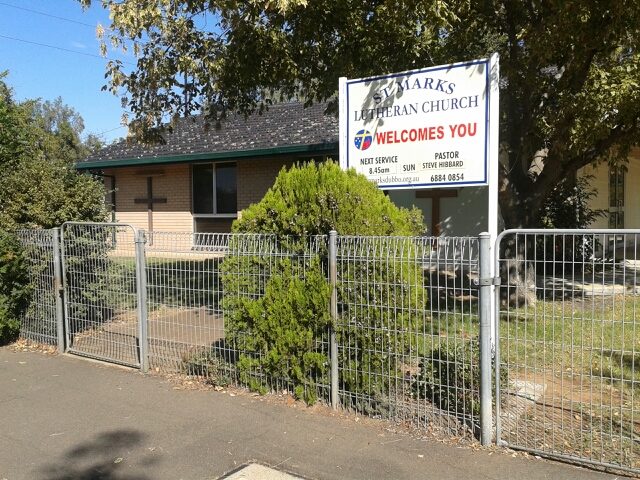Isaiah 63:7
I will recount the steadfast love of the Lord, … according to all that the Lord has granted us, … according to his compassion, according to the abundance of his steadfast love.

The steadfast love of the lord never ceases (Lamentations 3:22). This reminder of God’s steadfast love in His prophetic prophecy through Isaiah is hemmed in behind and before with reference to God’s vengeance and the rebellion of Israel herself. Suffering and death behind and before, just as in the Gospel today, Herod’s attack on Jesus murdering all boys in Bethlehem under 2 and Jesus’s own death on the cross. Death and suffering behind and before us, drought and fire, funerals and cancer, the evil foolishness of governments and authorities across this corrupt world and your own struggling against sin, death and the devil. Like the Israelites of old and Jesus Himself we are surrounded in suffering. But remember the abundance of the Lord’s steadfast love for you.
That word ‘steadfast love’ in Hebrew is a wonderful word, deep and comforting in it’s meaning. It means loyalty to covenants, like integrity and faithfulness, but also kindness and everlasting love because of what God has promised. Then of course the question is what has He promised?
Salvation in His love and in His pity redemption, carrying the Israelites all the days of old. He gave the Israelites such great goodness, strengthening them and sustaining them by His word and His creation, redeemed from Egypt but now suffering again because of their rejection of their saviour. God had promised through Moses, If you will truly hear my voice and keep my covenant, you will be my treasured possession, a kingdom of priests and a holy nation (Exodus 19:5-6). And this promise had been fulfilled, when Israel listened to God’s word it was a holy nation, under King David, under Hezekiah, under Josiah, treasured by God. However, when they rejected Him they suffered their sins and the evil of others.
And why the Israelites? Through Moses again God told His people, ‘you are a people sanctified. The Lord has chosen you … not because you were many, but because the Lord loves you and is keeping His promise to your forefathers, to Abraham (Deuteronomy 7:6-8). And that promise? I will make you the father of many nations, will establish my covenant with your descendants through the generations giving them this land of Canaan, I will be their God; and now the part we care more about, through you all peoples of the earth will be blessed (Genesis 17:4-8; 12:3). Now we know God kept those first two promises, Abraham the father of the Israelites, Edomites, Arabs, Midianites, father of many nations. And the second promise, the Israelites after receiving the fulfilment of another promise of protection then escape from Egypt did settle in that land of Canaan. But what of that last promise? Through you all people will be blessed? How have all peoples been blessed through Abraham?
Well, the answer as I’m sure you know is Jesus, Abraham’s descendent. He came to redeem, not just the Israelites, not just the descendants of Abraham, but all the peoples of this world (Isaiah 49:6). God Himself, the second person of the Trinity, descended to be born a human, to live and suffer just like you and me, attacked by Herod, by this corrupt world, hostile and rejecting its own creator, the one who loves them. He came into this world He created, and His own did not receive Him (John 1:11). Jesus lived a life truly hearing and trusting God’s Word, unlike the failure of the ancient Israelites, walking God’s way and speaking the truth of God’s love and faithfulness, His covenant loyalty. Jesus suffered because you and I want to sin, we don’t like to hear that we are wrong rather we desire to walk our own ways and trust not in our creator. Jesus suffered ridicule, abuse, rejection, and finally death because He held tight to God’s Word, to the truth, to love, in the face of this corrupt world. He died, and if He were just a human that would be the end of the story again no comfort for you, but He is not just fully human, but also fully God. Rising from death, God and man united and victorious over all evil, redeeming and glorifying this humanity Jesus was given authority over all things. What He says goes, and He keeps His promises despite His suffering and despite yours.
Now what does Jesus say? I will send you a comforter to be with you forever, the Spirit of truth … He will teach you all things and remind you of all that I have said (John 14:15-27)! The Holy Spirit came into this world at Pentecost giving birth to the church, another promise kept, but again what is this to you? When did The Father, through Jesus by the Holy Spirit promise you anything? Promise you adoption as His sons, His children? Promise forgiveness and salvation, Redemption or deliverance? When were you joined up with this salvation from your sin, this victory in Christ over death and the devil? When did God promised all this to you? Baptism into His name. The Holy Spirit through the New Testament writers teaches us from that fiery day of Pentecost (Acts 2:38-39) that this message and baptism was for those who listened, their children and all who are far off; that is you and me! The Holy Spirit goes on to promise through Paul that He comes to you through baptism and you are adopted as God’s children, and more that you have been joined into Christ, part of His body and one with Him reconciled to God, saved and redeemed (Titus 3:4-8; Galatians 3:26-27; Romans 6:3-11; 1 Peter 3:21). Today we have heard again why God’s loyalty to His promises is such a comfort to us, and no one can take them away from you, you can’t be unwatered, unbaptised; and you did nothing to earn these promises you just lay there or stood there as the Triune God, Father, Son and Spirit, working through the Word of promise, the pastor and the water baptising you into His family, washing you clean from all sin and bringing you into the everlasting life of Jesus Christ. You are in Him, this is God’s promise to you and He is faithful.
Not just this but, He remains faithful even if the baptised goes on to reject Him, rejecting the truth. It’s not that all who are baptised are automatically saved, just like not all those descended of Abraham are God’s children. Jesus tells us, if we reject Him on Earth, He will reject us before the Heavenly Father (Luke 10:16). But in His wisdom God gave us baptism and promised that He is at work in it giving His promises to you specifically, that you can be sure that He loves you. This is why I don’t often condemn those who don’t trust the promise, I don’t know your heart like our Lord does, but I know when I simply say ‘you are forgiven in the name of the Father, and of the Son and of the Holy Spirit’ all those who trust God’s Word just brought again to them receive His forgiveness and all those who don’t trust Him, don’t. I don’t need to tell those who reject God’s promises that they don’t receive them, because they already know that.
But you, you who trust God, who suffer the attacks and temptations of the devil, you and I both need to hear again God’s Word that He spoke to you all those years ago at your baptism, to guard against fear and forgetting. This is why the Holy Spirit sent all those letters we now have in the New Testament to encourage and strengthen you and all the baptised church of God, to remind you that you are in Jesus, God’s children, you have overcome in Him sin, death and the devil, all the suffering in this world and that in the end, either your death or Christ’s return, you will be renewed, glorified and freed from death and the devil just as Jesus was because you are joined with Him (Philippians 3:21).
Baptised with Christ into His death, you like those Israelites Isaiah prophesied too are in the midst of suffering. Suffering because of stress, sickness, worry and now because you are in Christ suffering the increased attacks of the devil from many directions, just as Jesus was attacked by Herod as a toddler. But through all this suffering you have God’s sure promises to hold on to, the certainty of the love He has shown throughout the ages, to Abraham, to the Israelites, apostles, to Christians and to you. He promised in baptism you have been joined to Jesus, sharing in His flesh and blood that has destroyed death and the devil. This is your life in Jesus, free from sin, from fear of death, and free from fearing the sufferings of this world. This present suffering is not the end He will come and renew all things. This is His promise and He is loyal to His promises, so you can Have peace.
 And so the peace of God which passes all understanding guard your hearts and minds in Christ Jesus. Amen.
Joseph Graham.


